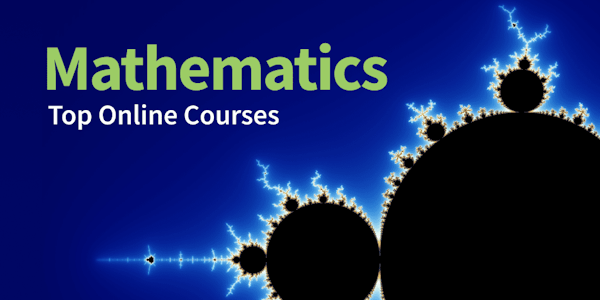Vector Calculus for Engineers
The Hong Kong University of Science and Technology via Coursera
-
5.7k
-
- Write review
Overview
This course covers both the theoretical foundations and practical applications of Vector Calculus. During the first week, students will learn about scalar and vector fields. In the second week, they will differentiate fields. The third week focuses on multidimensional integration and curvilinear coordinate systems. Line and surface integrals are covered in the fourth week, while the fifth week explores the fundamental theorems of vector calculus, including the gradient theorem, the divergence theorem, and Stokes' theorem. These theorems are essential for subjects in engineering such as Electromagnetism and Fluid Mechanics.
Note that this course may also be referred to as Multivariable or Multivariate Calculus or Calculus 3 at some universities. A prerequisite for this course is two semesters of single variable calculus (differentiation and integration).
The course includes 53 concise lecture videos, each followed by a few problems to solve. After each major topic, there is a short practice quiz. At the end of each week, there is an assessed quiz. Solutions to the problems and practice quizzes can be found in the instructor-provided lecture notes.
Download the lecture notes from the link
https://www.math.hkust.edu.hk/~machas/vector-calculus-for-engineers.pdf
Watch the promotional video from the link
https://youtu.be/qUseabHb6Vk
Syllabus
- Vectors
- Vectors are mathematical constructs that have both length and direction. We define vectors and show how to add and subtract them, and how to multiply them using the dot and cross products. We apply vectors to study the analytical geometry of lines and planes, and define the Kronecker delta and the Levi-Civita symbol to prove vector identities. Finally, we define the important concepts of scalar and vector fields.
- Differentiation
- Scalar and vector fields can be differentiated. We define the partial derivative and derive the method of least squares as a minimization problem. We learn how to use the chain rule for a function of several variables, and derive the triple product rule used in chemical engineering. We define the gradient, divergence, curl, and Laplacian. We learn some useful vector calculus identities and derive them using the Kronecker delta and Levi-Civita symbol. We use vector identities to derive the electromagnetic wave equation from Maxwell's equation in free space. Electromagnetic waves form the basis of all modern communication technologies.
- Integration and Curvilinear Coordinates
- Integration can be extended to functions of several variables. We learn how to perform double and triple integrals. We define curvilinear coordinates, namely polar coordinates in two dimensions, and cylindrical and spherical coordinates in three dimensions, and use them to simplify problems with circular, cylindrical or spherical symmetry. We learn how to write differential operators in curvilinear coordinates and how to change variables in multidimensional integrals using the Jacobian of the transformation.
- Line and Surface Integrals
- Scalar or vector fields can be integrated over curves or surfaces. We learn how to take the line integral of a scalar field and use the line integral to compute arc lengths. We then learn how to take line integrals of vector fields by taking the dot product of the vector field with tangent unit vectors to the curve. Consideration of the line integral of a force field results in the work-energy theorem. Next, we learn how to take the surface integral of a scalar field and use the surface integral to compute surface areas. We then learn how to take the surface integral of a vector field by taking the dot product of the vector field with the normal unit vector to the surface. The surface integral of a velocity field is used to define the mass flux of a fluid through a surface.
- Fundamental Theorems
- The fundamental theorem of calculus links integration with differentiation. Here, we learn the related fundamental theorems of vector calculus. These include the gradient theorem, the divergence theorem, and Stokes' theorem. We show how these theorems are used to derive continuity equations and the law of conservation of energy. We show how to define the divergence and curl in coordinate-free form, and convert the integral version of Maxwell's equations into differential form.
Taught by
Jeffrey R. Chasnov
Tags
Reviews
4.8 rating, based on 251 Class Central reviews
4.8 rating at Coursera based on 1352 ratings
Showing Class Central Sort
-
Although I earned a BS degree in chemical engineering in 1999 and have taken multivariable calculus, Professor Jeffrey Chasnov’s Vector Calculus for Engineers was a great challenging learning process. I found the time needed to complete the course…
-
Бұл курс өте мазмұнды және пайдалы болды. Теория мен практиканың үйлесімділігі білімді жақсы меңгеруге мүмкіндік берді. Лекциялар нақты, түсінікті және жүйелі құрылымдалған. Практикалық тапсырмалар тақырыптарды терең түсінуге көмектесті, ал үй тапсырмалары материалды бекітуге ықпал етті. Оқытушылардың кәсібилігі жоғары деңгейде, барлық сұрақтарға толық жауап беріп, түсініксіз тұстарды жетік түсіндірді. Курстағы ресурстар мен материалдар өте сапалы әрі қолжетімді болды. Білім беру үрдісі интерактивті және қызықты өтті. Бұл курс менің кәсіби дағдыларымды жетілдіруге және білімімді тереңдетуге үлкен үлес қосты. Болашақта да осындай курстарға қатысуға ниеттімін.
-
Бұл векторлық курс үшін алғысым шексіз! Жоғары сапалы білім мен терең түсінік бергеніңіз үшін рақмет. Курс маған математикалық және физикалық ұғымдарды жақсырақ түсінуге көмектесті. Болашақта да осындай пайдалы курстарды жалғастыра беріңіздер!
-
The course on Vector Calculus was indeed a great challange to me but at the end of the day i have acquired a new and profound knowladge on the course as far as engineering is concerned. He is an outstanding Prof. I thought online learning might be difficult base on the fact that the lecturer might not break down the explanation to everyone. But the Prof explanation was so good to me and i think for many others. I have really improve in my mathematic knowladge of on differential equations mostly on the second derivative which i usually have issues.
-
Es un curso muy importante para ingeniería y ciencias. El profesor un excelente maestro y pedagogo nos deleito con Calculo Vectorial muy necesario para entender las leyes físicas y tópicos de geometría, que los estudiantes podremos usar como herramientas en el futuro profesional. ojala saquemos provecho de lo que hemos aprendido. Bien por Coursera y por el Profesor.
-
This class about vector calculus is probably one of the most interesting that I have ever seen. Everything is explained in an understandable way. It has helped me remember some notions I learnt a few years ago. Furthermore, I have learnt many other mathematical calculations and formulae. If you want to improve your knowledge, do not hesitate.
-
Very comprehensive course on most of the major concepts needed to understand calculations in electrical engineering
-
It gives you a complete basic of vector calculus, very helpful for mechanical and aerospace engineers.
-
A great refresher course if you already know vector calculus and would like to take a cursory glance to brush up the concepts. I didn't have the in-depth knowledge of the topic but tackling it on your own can at first seem daunting. It had been some…
-
I can only deliver a mixed review. The course presents a generous amount of material, and all the basics are covered, but the presentation, especially in the final week, is perfunctory at best, grinding through derivations and leaving many steps for…
-
Aprendí las caracteristicas generales incluyendo el tema cientifico de "Cálculo Vectorial". Y los resolvi intentando lo más que pude.
-
It was a good course and it surely helped clear my Fluid Mechanics and Multi-variable Calculus. As a mechanical engineering student, I was pleasantly surprised by the depth and practicality of the course content. This course, without a doubt, deserves a five-star rating for its outstanding quality. The video lectures are engaging, and the instructors' passion for the subject matter shines through their teaching. Additionally, the course materials provided, including lecture notes, supplementary readings, and problem sets, are well-organized and greatly contribute to the learning experience.
-
The course is very good and informative .
It is useful to understand calculus very easily . It is beneficial for engineers and branches related to engineering and technology. -
It is challenging, but it is great helpful. there are many lectures I have watched several times.
From the lecture to the practice problem design, and the solution provided, very well organised.
If I find something I can not understand, I usually check carefully to find the solution.
Highly recommend Jeff's other courses for engineers. Actually, I start with the numerical method for engineers and find this one helps a lot in understanding the concepts in numerical simulation.
This series course helps me strengthen the foundation of mathematics. I do appreciate it. -
Neatly drawn workings and like thought-provoking questions (will attempt those I didn't manage to do on first short try). Vector calculus looks really cool now
-
Excellent course. The material is presented in an accessible, logical way. Interesting tasks and tests. You can study at your own pace. Super course.
-
1. Deep explanation of key concepts, e.g. Divergence theorem, Stokes theorem, etc. by hand writing in 10 min for each.
2. No knowledge was skipped. All the aspects of vector calculus are covered. The free PDF textbook could be also used as a reference book for a while.
3. Good design of each week. Each week is divided into 2-4 modules. Each module has many ungraded practice problems, which have solutions in the PDF textbook!!! This is really helpful. -
This course covers all essential concept of partial, line and surface integral, gradient, divergence, curl, laplacian which are the useful mathematical tools for convert the abstraction of physics theory to nice, able to evaluated equations.
Overall, the content of this course is more difficult than the general conception of matrix algebra and differential equation course , the formulas is complicated and its application is abstract and theoretical. It takes more time to digest these new knowledge! More challenging more attractive of the world of mathematics. Worth your time to enroll this course! -
This indeed is one of the BEST courses in Vector Calculus with the BEST instructor teaching it. Professor Chasnov is highly organized and presents the contents in a clear manner. I have become fond of his excellent teaching style. Over and above, all engineers must take this course. I hope he teaches courses in PDEs, Integral Transforms, Complex Variables, ... in times to come to benefit the motivated mathematics learners all around the globe! This is terrific effort from him. I wish the best comes his way as a reward for his dedication. God bless.
-
Week three is the pivotal week for learning that I struggled with. Line and Surface integrals just did not come easy to me. A tutorial on the line and surface integrals in greater depth would have helped me since it is difficult to visualize what these always mean. The instruction was excellent, but I feel I needed extra help. Would love to take a course in just line and surface integrals.
An extremely valuable course for anyone in physics or engineering. Take it as soon as you can.






